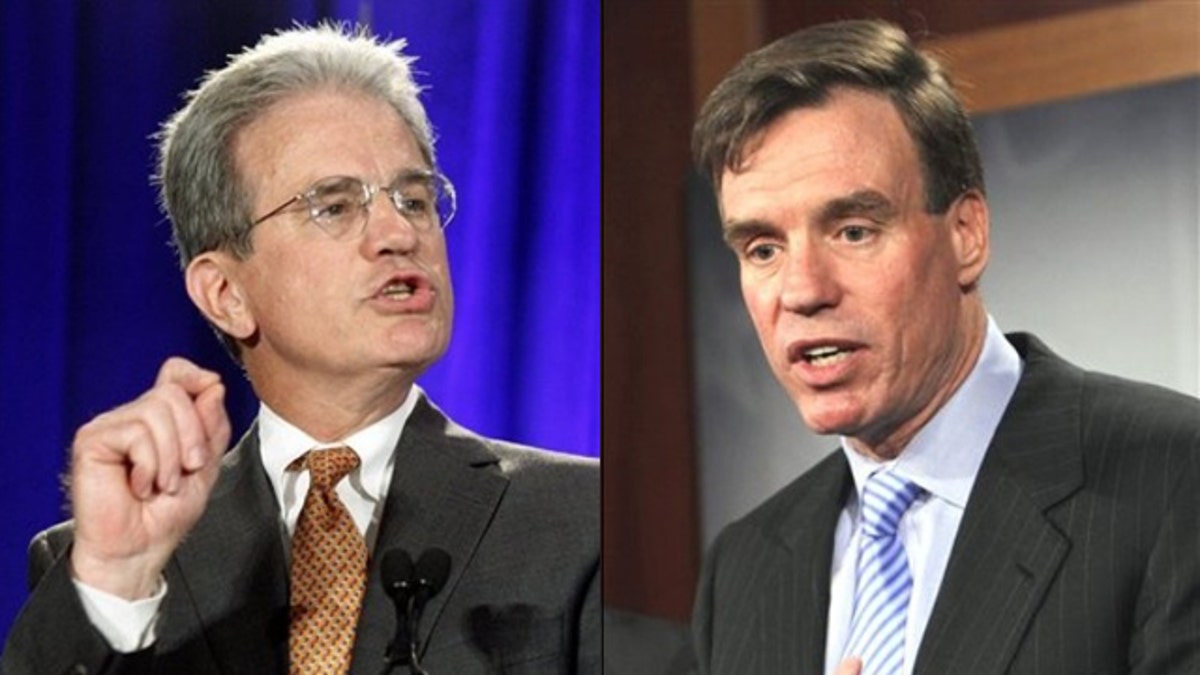
Shown here are Sen. Tom Coburn, left, and Sen. Mark Warner. (AP)
Get ready for another deficit reduction plan. And this one, like the others on the table, will tick off a lot of people, its authors say.
Two members of the so-called "gang of six" -- a bipartisan group of senators working to craft a long-term spending plan -- said Sunday they're making progress on their proposal, despite concerns expressed last week that the talks could be in trouble.
And, in claiming the plan would take a balanced approach, they predicted Republicans and Democrats alike would despise it.
"Let me assure you, we're going to make everybody mad," Sen. Mark Warner, D-Va., said.
The work product is the latest in a string of cure-all budget plans meant to take the country off its course of seemingly endless debt accumulation. But the pressure is on, with partisan sparks flying over the plans already on the table. After Republican Rep. Paul Ryan outlined his budget proposal, Democrats said its prescribed overhauls to Medicare and Medicaid were cruel to seniors and the poor. After President Obama countered with a plan of his own, Republicans slammed him for turning to tax increases and suggested the rest of the document was fuzzy on details.
Meanwhile, the comprehensive report from the fiscal commission created by the president more than a year ago died in committee. Underscoring the importance of the ongoing "gang of six" negotiations, fiscal commission co-chairman Alan Simpson said after Obama's budget speech Wednesday that people need to "pray for" the talks.
Though Sen. Tom Coburn, R-Okla., who is part of the talks with Warner, said last week that the group was "not anywhere close" to an agreement, he said Sunday "there's a good chance that we'll be able to come up with a bipartisan agreement that people can swallow."
That doesn't mean they'll be happy.
"Nobody is going to like what we come up with," Coburn told "Fox News Sunday." "The left isn't going to like it and the right isn't going to like it. And that's one thing that would be an indicator that is probably the best compromise we're going to be able to get."
Coburn said Americans need to know that lawmakers in Washington are "willing to lose elections to do what is best for the country."
Coburn did not elaborate on the details of the plan, but Warner offered a few glimpses.
In an interview with CBS' "Face the Nation," he said "everything has to be on the table."
Warner said the group was working off the proposal from the president's fiscal commission and would be "touching every part of the problem," including Social Security -- something largely excluded from both Ryan's proposal and Obama's.
"Part of this is just math -- 16 workers for every one retiree 50 years ago, three workers for every retiree now," Warner said.
He also said the tax code needs to be addressed, not necessarily through tax increases but by eliminating deductions. He said the group is looking to impose about $3 in cuts for every $1 in increased revenue.
"Charitable deduction, home mortgage deduction -- if we would cut back on some of those, we could actually lower rates and still increase revenues," he said. Warner said the group is "very close" to a deal.
Anything that even resembles a tax increase, though, is anathema to many Republicans.
Ryan, on "Face the Nation," reiterated that his party opposes the president's call to roll back the Bush tax cuts for top earners. He, like Warner, stressed the importance of targeting loopholes and deductions -- though Warner suggested Ryan's plan doesn't do enough to raise revenue.
Tea Party-backed Sen. Rand Paul, R-Ky., also said tax increases are not the answer. Rather, he said the two parties could find middle ground by putting the Pentagon on the budget chopping block.
"The compromise is not to raise taxes," Paul said on CNN's "State of the Union." "The compromise is for conservatives to admit that the military budget's going to have to be cut. ... The compromise is where we cut, not where we raise taxes."
Treasury Secretary Tim Geithner said Sunday that despite the bickering, Republicans and Democrats do agree on something -- both sides are calling for about $4 trillion over the next decade or more.
"We can agree on the broad targets," he said on NBC's "Meet the Press."
Technically, Republicans are calling for $4.4 trillion in deficit reduction over 10 years, and Obama is calling for $4 trillion over 12 years. The Republican plan incorporates far more spending cuts than Obama's. But Geithner said the parties have the "same basic view" of the end goal.
The "gang of six" is not expected to have a report until after the two-week spring recess that starts Monday. The other members on that panel are Sens. Dick Durbin, D-Ill.; Saxby Chambliss, R-Ga.; Kent Conrad, D-N.D.; and Michael Crapo, R-Idaho. Conrad threatened last week that if the group doesn't come up with something soon, he might propose his own budget plan.




